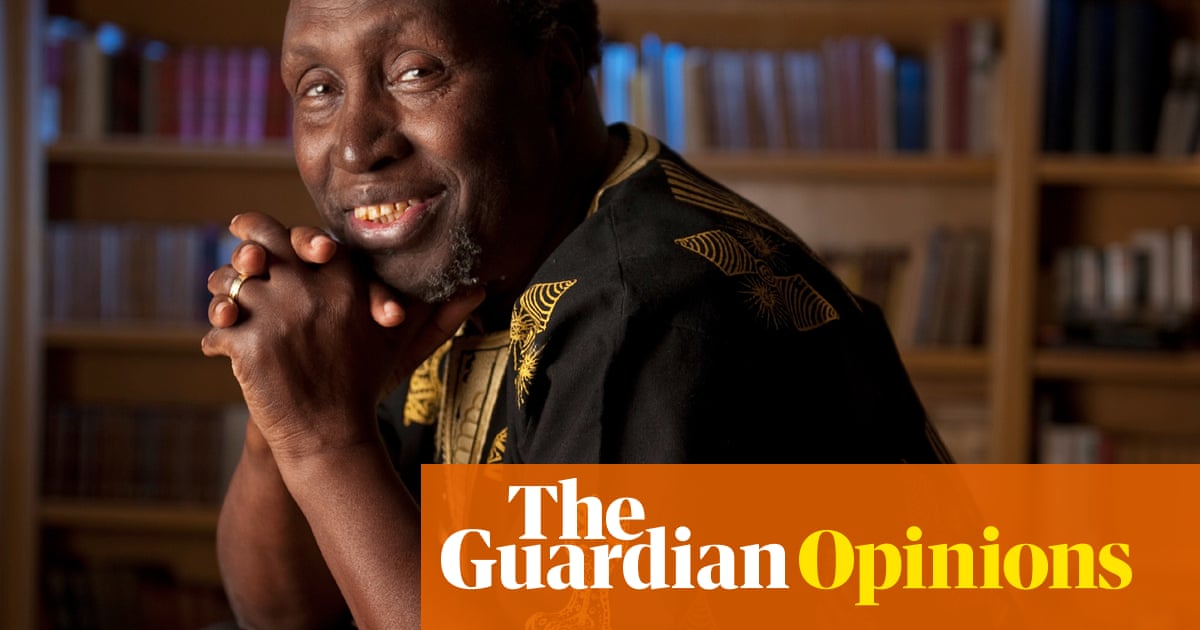Growing up in post-independence Nigeria in the 1970s, at home you always had access to the Bible if you were Christian, or the Qur’an if you were Muslim, along with books in the Heinemann African Writers Series. Things Fall Apart by Chinua Achebe was a staple, and the plays of Wole Soyinka: The Lion and the Jewel, most likely, or The Trials of Brother Jero. Often accompanying them were books by Ngũgĩ wa Thiong’o – I remember we had both Weep Not Child and The River Between. And even if you didn’t have them at home, you’d soon encounter them in school – they were standard set texts, from secondary school to college.
These three writers belonged to the so-called first generation of African writing, the generation that started publishing in the 1950s and 1960s. The three names stood, like the legs of the three-legged pot, under African literature, while in the pot was cooking whatever fare the minds of these writers conceived of. They shared a similarity of subject matter: pro-independence, pan-Africanist, postcolonial theory, but stylistically they were very different from one another. Kenyan Ngũgĩ, unlike the two Nigerians, was shaped by very stern political obstacles, pushing him to take very radical positions on politics and language.
Sign up toBookmarks
Discover new books and learn more about your favourite authors with our expert reviews, interviews and news stories. Literary delights delivered direct to you
after newsletter promotion
In 1955, back home from school on vacation, he found his family home destroyed by the British colonial soldiers. His home town of Limuru had been razed to the ground. This was during the emergency, what the British called the Mau Mau uprising. This incident formed one of the motifs in his early fiction. His early novels, Weep Not Child (1964), The River Between (1965), A Grain of Wheat (1967) and Petals of Blood (1977), were written in English, under the name James Ngugi, before he stopped writing in English and changed his name to Ngũgĩ wa Thiong’o.
In his time as faculty member in the English department in Nairobi University, in the 1960s-70s, he fought for a curriculum change – in nomenclature and in substance, from English Literature to Literatures in English. It was a very important move that would shape other nascent departments of English Literature around Africa, by insisting upon a parity in all levels between English literature and other literatures in their original languages and in translation – those of African languages in particular.
Ngũgĩ’s generation saw the role of the writer as that of a teacher to the newly independent Africans, who were struggling to make sense of the modern world forcibly thrust upon them by colonialism. For Ngũgĩ, the teacher was always a Marxist activist, something of a community organiser. His plays, The Trial of Dedan Kimathi (1976) and I Will Marry When I Want (1977), were approached as community theatre, at the level of the people, for the people, and their highly political and critical content caused rioting on the streets when they were staged, for which Ngũgĩ was arrested by the Daniel Arap Moi regime.
Arrests and detentions and exile were rites of passage for African writers of the first generation. Ngũgĩ’s move into exile introduced his work to a new audience; he went on to produce some of his most important critical essays and polemical works. Decolonising The Mind: The Politics of Language in African Literature (1986), in particular, occupies a central position in his body of work because of the early groundwork it laid in the field of postcolonial literary theory.
His migration also included a migration away from the English language to his mother tongue, Gikuyu. Even when his position on the importance of writing in one’s mother tongue grew less compelling than it was before the rise of world and global literatures, he held on to it, not for any practical value, but for the symbolic purpose of decolonising the mind. Growing up, we saw writers of Ngũgĩ’s generation like prophets, figures from the Old Testament. That is why, when they die, we realise that the age of prophets is coming to an end, and we who are left behind must murk about the best we can, while we can.
